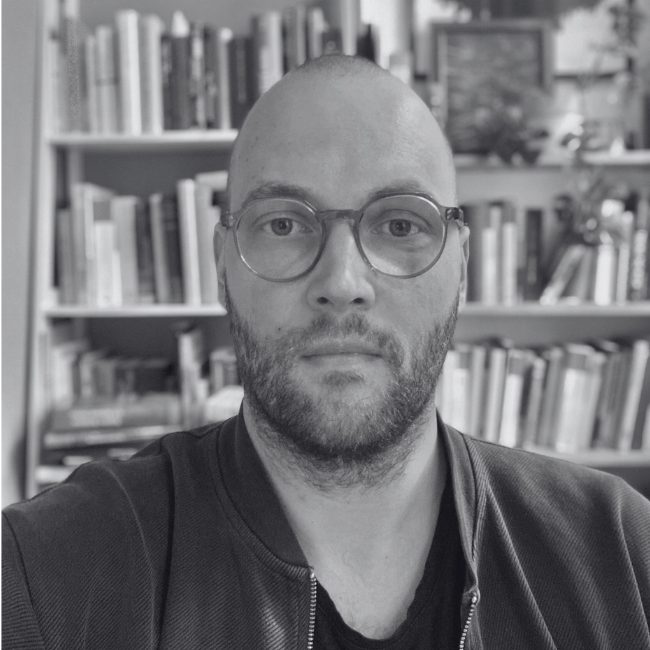
Dr. Ronny Grundig
Senior Researcher – Office
Email: ronny.grundig[at]uni-greifswald.de
Bahnhofstr. 51
Room 13
17489 Greifswald
Ronny Grundig is a postdoc researcher and coordinator at the IFZO. On November 10, 2025, he began a one-year fellowship at the Roy Rosenzweig Center for History and New Media and at the German Historical Institute in Washington, D.C. He studied history and social sciences as well as military studies in Erfurt and Potsdam. He wrote his dissertation Vermögen vererben. Politiken und Praktiken in der Bundesrepublik und Großbritannien (1945-1990) within the framework of the Hans Bröckler Foundation's research training group "Soziale Folgen des Wandels in der Arbeitswelt". After completing his doctorate, he was a research assistant at the Leibniz Centre for Contemporary History Research in Potsdam from January 2021 to December 2022 and worked on a DFG project on the social history of East German crafts in the transformation period (1980-2000).
Monograph:
Vermögen vererben. Politiken und Praktiken in der Bundesrepublik und Großbritannien 1945-1990, Göttingen 2022.
Essays:
Nationale Kultur statt privates Erbe. Nachlässe britischer Landadeliger nach dem Zweiten Weltkrieg, in: Simone Bogner/Gabi Dolff-Bonekämper/Hans-Rudolf Meier (Hg): Praktiken des Erbens Metaphern, Materialisierungen, Machtkonstellationen, Ilmtal-Weinstraße 2022, S. 164–175. [peer review]
Im Kino arbeiten. Eine alltagsgeschichtliche Annäherung am Beispiel der Kreislichtspielbetriebe
Eberswalde und Bernau, in: Anna-Rosa Haumann/Kathleen Kröger/Marcus Plaul (Hg.): Das Kino in der
DDR. Perspektiven auf ein alltagsgeschichtliches Phänomen, Baden-Baden 2022, S. 147–159.
zusammen mit Jessica Lindner-Elsner, Arbeitsbeziehungen und soziale Ungleichheit – Die Arbeitsgesellschaft der DDR, Bundeszentrale für politische Bildung: Lange Geschichte der Wende, https:// www.bpb.de/themen/deutsche-einheit/lange-wege-der-deutschen-einheit/504568/arbeitsbeziehungen- und-soziale-ungleichheit-die-arbeitsgesellschaft-der-ddr/
Reiche im Sozialismus? Erbschaftsteuerakten als Schlüssel zur Erforschung von Vermögensverhältnissen in der DDR, in: Schweizerisches Jahrbuch für Wirtschafts- und Sozialgeschichte 36 (2020), S. 115–127. [peer review]
Lachende Erben? Eine Skizze zur Erforschung der Vererbungspraxis Kinderloser, in: Jürgen Dinkel/Dirk van Laak (Hg.): Reader –Erben und Vererben in der Moderne, Justus-Liebig-Universität Gießen, Juli 2016, S. 54–59 [2017], hsozkult.geschichte.hu-berlin.de/daten/2017/Dinkel--vanLaak--Erben- und-Vererben-in-der-Moderne--2016.pdf
Media articles:
Erbschaftsteuer: Darum zahlen reiche Erben kaum Steuern, in: Gegenblende. Debattenmagazin, online verfügbar: https://gegenblende.dgb.de/artikel/++co++7c2a7550-6030-11ed-9163-001a4a160123
Erbschaftsteuer: Neoliberale Narrative überwinden, in: einblick. Gewerkschaftlicher Info-Service Nr. 12 (2022).
History of Neighborhood in Germany in the 19th and 20th century
I am currently working on a project on the history of neighborhoods in Germany in the 19th and 20th centuries. A neighborhood affects the people who live in it. It is an important social space of everyday interaction and at the same time a point of reference when individuals remember and tell their life stories. Growing up in a particular village or urban neighborhood, and thus in a specific milieu, shapes a person's socialization and influences his or her later life. Being able to decide whether to live in a neighborhood or to be forced to live there for economic reasons points to socio-cultural differences and economic inequalities. Neighborhoods, in turn, provide information about the social condition of their inhabitants or are at least an indicator for it.
The habilitation project will follow a three-step approach and shed light on how neighborhoods were imagined, planned and how they were lived in different times. The social regulation of neighborly relations plays a role as well as practices of neighborly interaction and micro-practices of spatial and social segregation; the history of rumor/blasphemy/denunciation and the representation of neighborhood in popular culture.
My planned habilitation project will thus focus on mentalities, cultural formations, and physical cultural heritage in urban and rural spaces in order to explore the role of informal social relations outside of kinship networks in an era in which a transformation towards an ever-increasing formalization of social relations has taken place through the expansion of modern (social) statehood while at the same time the individualization of lifestyles has taken place.
